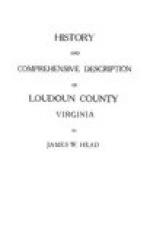The houses, many of which are of brick and stone construction, are built in a compact and substantial manner. In the town and its environs are many of the most palatial residences to be seen in Virginia. There are several well-kept public roads leading from the town to the surrounding country seats and stock farms, nearly all of which are modernized reminders of the old plantation days.
With an elevation less than most points in the County, Leesburg, nevertheless, shares with them the distinction of being unsurpassed for healthfulness and picturesqueness of surroundings.
Crossing at right angles, its streets are regular and spacious and lighted by electricity. Many of its dwellings and business houses are also equipped with electric lighting facilities, power for which is generated at a plant located near Belmont, on Goose Creek, and controlled by Leesburg capitalists. In almost every quarter of the town are brick and granolithic sidewalks, fringed with the usual varieties of shade trees.
Some of the municipal advantages not already enumerated are a sewerage system, a fire department, a public library, police protection and a thoroughly modern system of water-works of a capacity sufficient to supply the entire corporation with absolutely pure water from a noted spring issuing near the base of Catoctin Mountain.
Some of the public buildings are a town hall, one of the largest brick edifices in Northern Virginia; a comparatively new court-house and a clerk’s office,[15] both venerable structures with imposing facades lending them an exquisite air of Colonialism, the two liberally disposed over a fenced area with sloping lawns and umbrageous shade; a brick jail (County) containing eight steel cells, commodious residential quarters for the jailer and his family and having, as an humanitarian feature, a sunny court with towering walls; a remodelled brick academy and a colored school, both comprising primary, intermediate, and high school divisions, and provided with ample educational facilities and extensive playgrounds.
[Footnote 15: Prior to 1873, the Leesburg Academy.]
The town has 7 churches representing all the leading denominations, a Young Men’s Christian Association branch, 5 fraternal orders and a weekly newspaper. Eight trains arrive at and depart from Leesburg daily.
Among the local enterprises are two handsome banking houses (the “Loudoun National Bank” and “Peoples National Bank"), 2 large hotels affording accommodations for 130 guests, several boarding houses, stores handling every class and grade of merchandise, an artificial ice plant with a daily capacity of 5 tons, a large race course on the outskirts of the town where are held annually a horse show, races and other like events, a confectionery and bakery, an ice cream factory, a pop factory, two harness factories, a lumber and planing mill, 2 private schools, 3 cobblers’ establishments, 2 livery stables, 3 blacksmith shops, 2 furniture houses, 2 undertaking establishments, 2 grain elevators, a lime quarry, 3 wheelwright shops, 2 tinning establishments, a concrete construction plant, monument works, wood and coal yard, Standard Oil Company’s branch and packing house.




